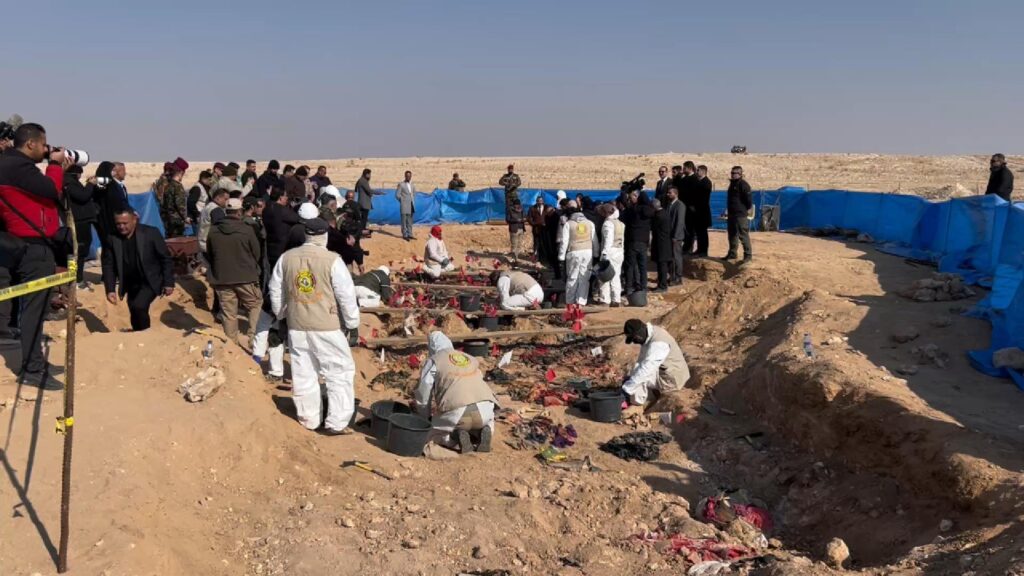Iraq: Water flows to conflict-affected communities south of Mosul

In June 2014, ISIL took control of Sallamiya town, on the Tigris River, in Hamdaniya district, Ninewa Governorate. Thousands of residents fled the area, mainly to adjacent governorates, or farther south, to Najaf and Kerbala.
Countless homes and community infrastructure were damaged while ISIL held the area, including the Sallamiya irrigation system which was built in 1980. The system is vital to local farmers growing fruits and vegetables, especially beans and watermelon.
In Sallamiya, nine of the 10 irrigation pumps were damaged.
The irrigation system’s water carrying capacity was further reduced due to a lack of maintenance over the last few years.
Sallamiya was retaken from ISIL in November 2016. More than 4,300 IDPs have since made their way back to the town and wider area.
In close cooperation with Government authorities, IOM, the UN Migration Agency identified Sallamiya as an area in need of rehabilitation support, in order to assist and enable internally displaced families to return home.
Returnees include many farmers, who are eager to resume their agricultural activities.
Through a participatory needs assessment, facilitated by IOM, the local community identified the rehabilitation of the irrigation system as a top priority.
The project began in October 2017, in cooperation with the Government of Iraq and with the financial support of the Swedish International Development Cooperation Agency (SIDA).
The project required the construction of a new concrete support wall along the Tigris River, the repairing and replacement of 10 pumps and the rehabilitation of generators, electrical system and pump station transformers.
IOM continues to support the recovery of agricultural land in the area. Drainage channels are currently being cleared and IOM intends to start a water conservation campaign in coordination with the water resource section of the Hamdaniya district authorities.
More than 60 people, including returnees and host community members, participated for two weeks in a “cash-for-work” scheme to dig out the dirt and debris from 20 kilometres of irrigation channels.
Water is now running through 20 kilometres of canals, powered by the Sallamiya irrigation system.
The water currently reaches 12 villages and 2.5 million square metres of farmland, which will positively impact an estimated 14,000 people.
The Mayor of Nimrood who covers Sallamiya, Mr. Ahmed Hussain, opened the irrigation system at an official handover ceremony on 8 March with IOM.
“This cooperation between Ninewa governorate and IOM has had a positive impact on employment and agricultural production in the region. It will also raise the standard of living and income for people of this area, who are located within the area of the irrigation system,” said Ahmed Hussain, the Mayor of Nimrood that covers Sallamiya.
Muktar Hassan Saber Kasim and his wife have three girls and four boys, between the ages of 8 and 23 years. They all left the Sallamiya area in June 2014 when they heard that the city of Mosul was taken by ISIL. All nine family members escaped in one car. They only had the time and space to take their clothes.
The family fled to Najaf governorate, and survived with the help of friends and the local community, who provided them with a house and basic supplies.
They returned to the Sallamiya area in April 2017, and while their land is not damaged, their house was partially destroyed. Their farming equipment was also stolen, but Hassan managed to retrieve them from nearby locations.
Prior to the irrigation system getting fixed, Hassan used a generator to pump water from the river to the farm which was very costly because of the pipelines, fuel and oil.
"With the irrigation system now repaired, I will save the money that I spent on pumping water, and use it towards tools and equipment to increase the farm’s production,” Hassan explained.
He grows tomatoes, eggplants and other vegetables, and also produces over 20 tons of watermelon per year.
"My hope is that all the community members will work together to be one family again, with no difference between groups."
Sheik Attalla Mahmood Ataiya, his wife, five sons and two daughters fled their area just before ISIL arrived.
While they were displaced, they lived in a tent. Attalla returned while ISIL was still in his town. “I did not want to leave my farm. I came back to protect the farm and our area. We had a horrible experience under ISIL.”
He estimates that 20 per cent of his belongings were damaged. “For three years there was no agriculture because there was no water.”
He started planting again in February 2017.
“We grow beans, tomatoes and watermelons. Some watermelons grow up to 30 kilograms! The beans are my favorite, because they provide us with a significant income, and because they can be preserved and eaten in the winter months.”
Attalla is pleased that his sons plan on becoming farmers after finishing school.
“This project is great… the rehabilitation of the water system is a very important project for our area.”
Across Iraq, more than 2 million Iraqis continue to be displaced, while 3.8 million have returned, since the crisis began in January 2014.

